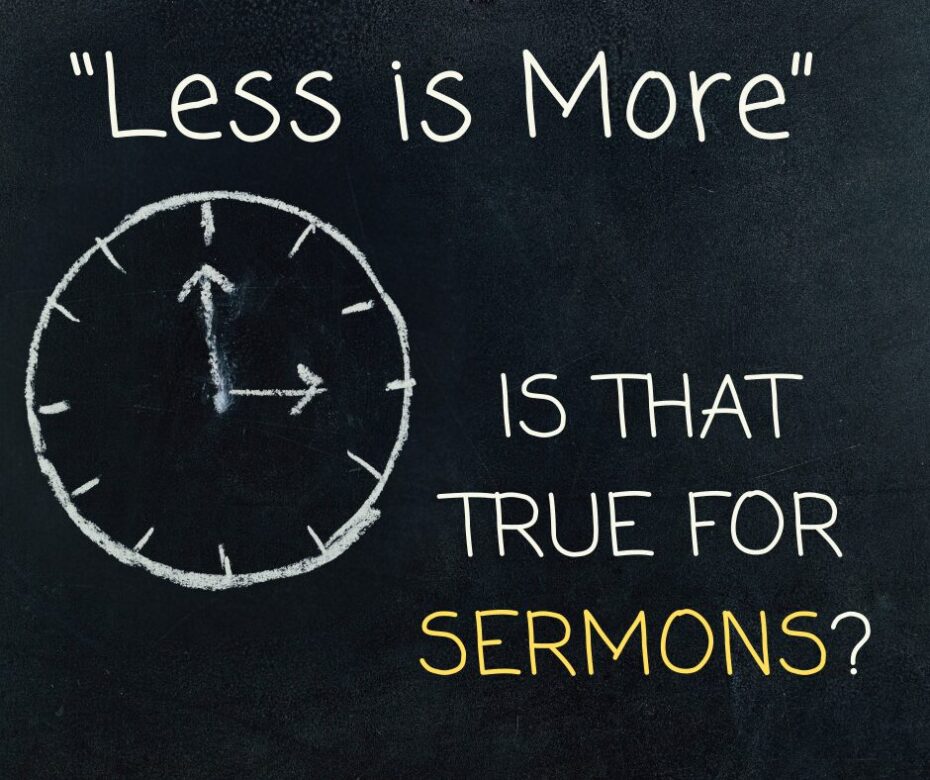How is it then, brethren? Whenever you come together, each of you has a psalm, has a teaching, has a tongue, has a revelation, has an interpretation. Let all things be done for edification (1 Cor 14:26).
Introduction
The Bible does not answer this question.
In Acts 20, Paul spoke all night, from around sundown to sunrise. However, there is nothing to suggest this was normal. He did this because it was a one-time event.
Ezra and his thirteen assistants spoke for around six hours (Neh 8:3). But this was also an exceptional situation.
One of my seminary professors, Dr. Howard Hendricks, liked to say, “He who communicates less communicates more.”
There is some truth in this.
If you try to pack in too much information, people cannot take in most of it.
Some disagree. A 9marks.org article entitled, “How Long Should a Sermon Be?” says just the opposite is true: “Push your audience because more is more.” The article suggests gradually lengthening your sermons, training your audience to listen longer. That is possibly a good idea.
Dr. Brian Biedebach of MacArthur’s The Master’s Seminary supports the idea that longer sermons are better if you connect with your audience.
One problem I see is that, typically, the longer a preacher preaches, the less well-crafted his message is.
The previously mentioned 9marks.org article says:
Pew Research Center recently analyzed 50,000 sermons preached between April 7 and June 1, 2019, in order to determine the median sermon length in the United States. Their answer? 37 minutes.
It went on to show how the Pew Research Center broke that down by various traditions:
- historically black Protestants: 54 minutes;
- evangelicals: 39 minutes;
- mainline Protestants: 25 minutes;
- Roman Catholics: 14 minutes
I was surprised to see a study from propreacher.com. It studied fifty churches and found that “The total average sermon length of the 50 fastest-growing churches in America was 40.365 minutes.”
Of course, in most of these megachurches, the pastor is an entertainer. A good entertainer can keep a crowd engaged. But that does not tell us whether they’re giving meaty sermons. A forty-minute strings–of–pearls sermon tells us little about the Word of God, no matter how much the congregation may like it.
The early church had multiple men each sharing short sermonettes. Paul wrote, “How is it then, brethren? Whenever you come together, each of you has a psalm, has a teaching, has a tongue, has a revelation, has an interpretation. Let all things be done for edification” (1 Cor 14:26; see vv 23-33).
But most churches do not do that today.
Most Evangelical churches allot twenty-five to forty minutes for the sermon.
John Stott made this interesting observation: “It doesn’t matter how long you preach, it should feel like twenty minutes.”
I realize most of you are not preachers. But you do attend churches.
Here are five ways the length of a sermon should impact you.
First, have sympathy for (and pray for) the one who preaches at your church. It is hard work, including deciding how long to speak.
Second, be an active listener. That means nodding your head when you agree. You might even say an occasional “Amen.” For me, it includes taking notes and having my Bible open to the passage. I find that taking notes keeps me engaged, as does underlining in my Bible.
Third, if you like a message, say so. Preachers are human, and encouragement encourages.
Fourth, if you think the messages are too long or too short, you should say something to the pastor or the leadership. They benefit from the constructive comments of the congregation.
Fifth, if you get an opportunity to preach, or to teach a class, keep in mind the attention spans of most adults (and children) today. Less may be more.
Keep grace in focus in all you do.


